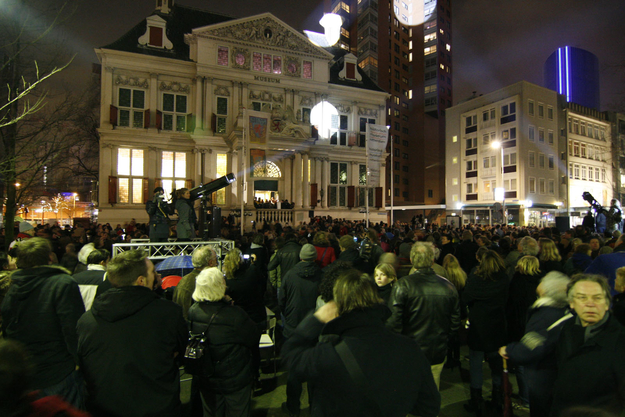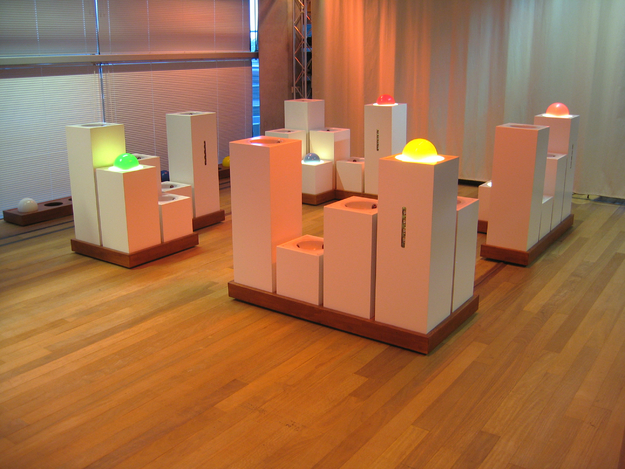Ignite
Ignite is run by locals, for locals. Founded in Seattle, the events are held around the world. Ignite is fast-paced and merciless, but most of all they're fun, thought-provoking nights, full of fresh ideas and clever insights. Speakers get five minutes to present their idea. They make use of twenty slides that auto-advance every fifteen seconds. Ignite serves as a platform for locals to connect offline and have a drink together.
Program
These speakers offer you an insight into the best, most promising, witty, sharp and ingenious projects and ideas surrounding the central theme of sensors. A nice mix of programmers and interaction designers, hackers, hardware know-it-all's, artists and scientists.
Edo Paulus
Edo presented the SonOrb, an interactive musical installation. It is part of the Klankenspeeltuin (Sound Playground) at Muziekgebouw aan 't IJ in Amsterdam.
Travis Goodspeed
Travis is a reverse engineer. He talked about hacking the IM Me, an instant messaging toy for kids. With a few alterations, the pink toy turns into a powerful tool that can open garage doors and measure the temperature of bell peppers in the supermarket.
Marjolein Charlotte Hessels
Marjolein is a physician studying at the Gerrit Rietveld Academy. She showed us two projects in which she uses a human heart beat as input to control light and a printer that plays a xylophone.
Fabienne Serriere
Fabienne runs the Hardhack event in Berlin, and organizes a lot of hands-on, hardware workshops and demos. She discussed ways to beautify sensors.
Supriyo Chatterjea
Supriyo worked with the Australian Institute of Marine Science (AIMS) in deploying a large-scale sensor network on the Great Barrier Reef. He rapidly explained a very complicated project.
Gordan Savicic
DS brut is an open source hardware prototyping platform for the Nintendo DS. With the help of DS brut, game consoles can easily be hooked up to a variety of sensors. Gordan is one of the developers.
Wilbert Baan
Wilbert is a creative technologist at SOMEHOW branded utilities. Until recently he worked for the Dutch national newspaper de Volkskrant. He gave a quick overview of the various ways to hack, use and abuse the Xbox Kinect. Inspiring stuff!
Erik Borra
Erik Borra is the lead programmer, as well as researcher, for the Digital Methods Initiative, and is involved in the 'Mapping Controversies in Science and Politics' European research project. He talked about using SEQL as sensors, and showed a few nice examples of how you can turn the massive amounts of data SEQL generates into understandable images that poignantly show something about a group of people, a country etc.
Helden
Bas and Thomas use sensors to involve the audience in their interactive installations. They presented their first collaborative project: the Chemistree.
Sonia Cillari
Sonia is an Italian media artist and architect. She presented two projects, amongst which her latest, Sensitive to Pleasure. Sensitive to Pleasure is an interactive installation in which the viewer indirectly influences the artist's body.

Nadya Peek
Nadya Peek is part of the physics and media group at MIT media lab.
Rnul Interactive
Rnul Interactive are Aart Muis and Rob Donkers. Their interactive installations deal with sound, images and physical movement. They analyze visitors' behavior and use this data to respond to them.
Vesna Manojlovic
Vesna developed and gives advanced courses for RIPE, such as RPSL, Routing Registry, DNSSEC, and IPv6. Tonight she discussed the necessity of transferring from IPv4 to IPv6 for large scale sensor networks.
Dirk van Oosterbosch
Fritzing is an open-source initiative that allows designers, artists, researchers and hobbyists to document their electronic-based prototypes, and to create a PCB layout for manufacturing. Dirk explained convincingly why everyone should use it.
Jean-Baptiste Labrune
Jean-Baptiste taught in art schools and scientific centers before settling down at the MIT Medialab as part of the Tangible Media Group. He participated in the Dev Camp and was the last speaker of the night.
More information
Sensor Fest takes place on November 23, 24 and 25 at Mediamatic Bank. It sheds a light on the newest developments in the world of sensors. Sensors are increasingly employed in the creative sector, as well as in the medical world, agriculture, new media, and by the government. What can sensors tell us about ourselves and the world?
Doors open at 8pm. One-day tickets have been knocked down from €5,- to €3,-. Grab yourself a bargain! RSVP by pressing the pink button at the top of this page. You can buy your tickets online or at the door.








